Threats. Vitriol. Hate. Ugly truth about women in sports and social media

Editor's Note: The following contains offensive, vulgar language used to address an important but sensitive subject matter. Reader discretion is advised.
The first time I was ever called a “cunt,” at least to my “face,” was on a sports blog in 2006. The comment that evoked the slur had nothing to do with the guy who aimed it at me. I had disagreed—politely—with something he had said about the Cubs’ starting lineup, and that prompted a reply along the lines of “Why would you bat Todd Walker second, you filthy cunt?” (If I recall correctly, it was because Walker had an OPS of almost .900 in spring training, but I digress.)
The offender had often debated lineups with other posters on the site, whose audience was almost all male. While I didn’t expect him to send me flowers for offering a different opinion, I certainly didn’t anticipate that kind of response. The site moderator quickly rebuked the offender and deleted the comment, but the message got through loud and clear: “You may not share your sports opinion while, at the same time, being a woman.”
Nine years later, in the midst of the Patrick Kane rape investigation, I found myself working from home Friday, having received a threat on Twitter that hit a little too close to home.
As an anchor for a prominent Chicago sports radio station, I understand my opinions are much more open to commentary now than they were 10 years ago, but this particular tweet contained personal details, and I simply did not feel entirely safe walking to my office. It didn't help matters that I, like far too many women, am a rape victim, but I wasn't taking any chances with my safety.
That threatening tweet, like the “cunt” comment nine years ago, was deleted immediately, but other unsettling remarks remained:
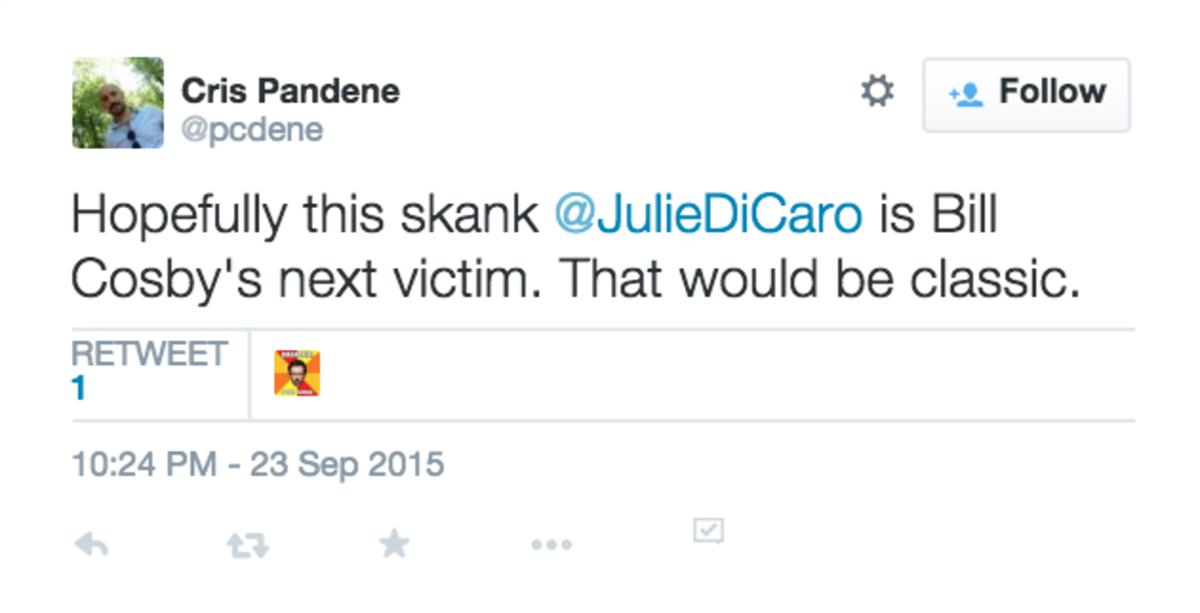
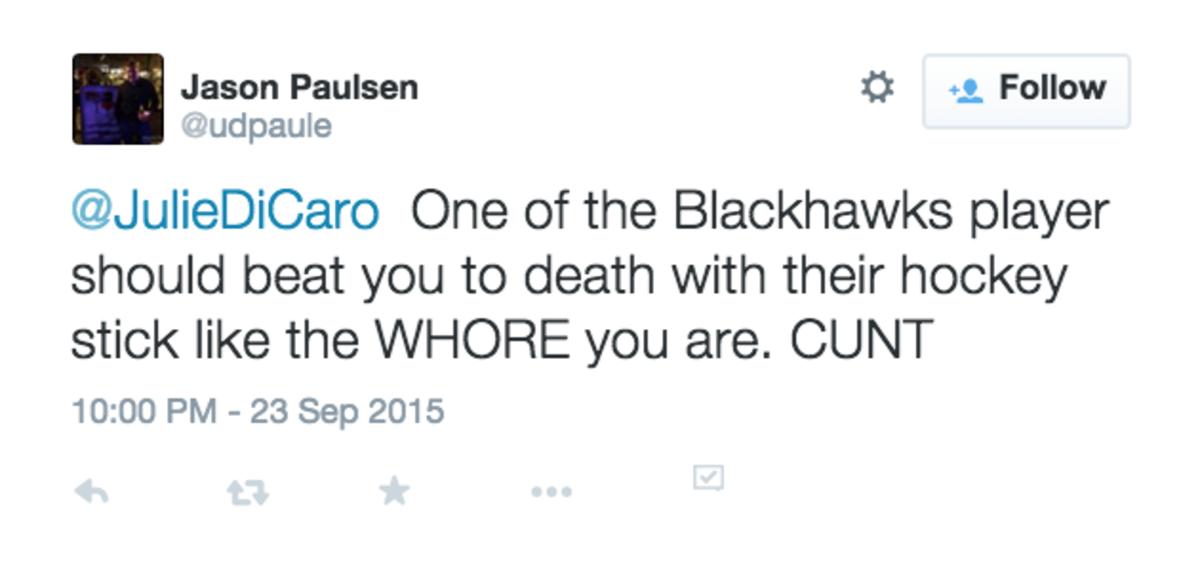
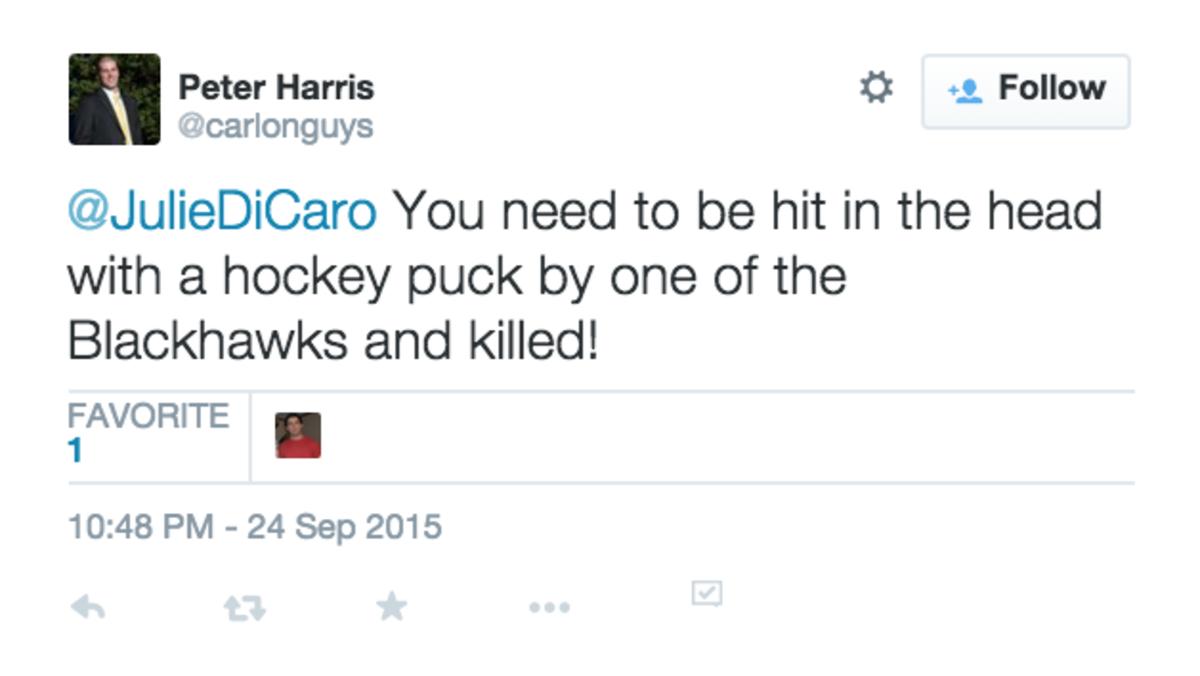
*****
Twitter has largely replaced blog comments when it comes to sports discussions, but for women, not much has changed. Those of us who dare invade this mostly male space are generally accepted, but there remains a vocal minority committed to forcing women out and rolling things back to the good ol' days, when women talked about recipes and PTA meetings and shoes. (Is that what they talked about? I’m guessing here.)
Unfortunately for these “meninists,” an entire generation grew up as the daughters of Title IX, with progressive fathers and kick-ass mothers who took us to football games, played one-on-one with us in the driveway, and taught us how to throw a fastball. With more and more women brought up to believe that sports can be their space, too, it’s natural for them to expect a seat at the table when sports come up in conversation. And yet, 40 years after Robin Herman became the first female reporter to enter an NFL locker room, women are still fighting a war against rampant sexism in the industry, with Twitter and Facebook serving as the new frontlines.
Lest anyone think such abuse comes only amidst the most controversial topics or charged subject matter, make no mistake, the very act of maintaining a career in sports journalism is enough to inflame those who feel that their special Y-Chromosome Club is under siege. ESPN’s Jen Lada remembers an email she received from one such “sports fan.”
“A viewer emailed me saying the only reason I had my job was because I had used my big mouth to service my boss and male colleagues,” Lada said. “When I responded that such vulgarity towards women set a terrible example for his young child (who was prominently featured in the man’s Twitter and Facebook profiles) he replied that his son and his middle school-aged friends agreed and were laughing at me while watching, as well. Parenting #FAIL.”
While such retrograde behavior disappoints regardless of the subject matter, it is particularly infuriating when it surrounds issues that disproportionately affect women, including rape and domestic violence. Even here, on subjects that demand a female perspective, those who are hell-bent on making women feel unwelcome and unsafe respond in the most vile ways imaginable.
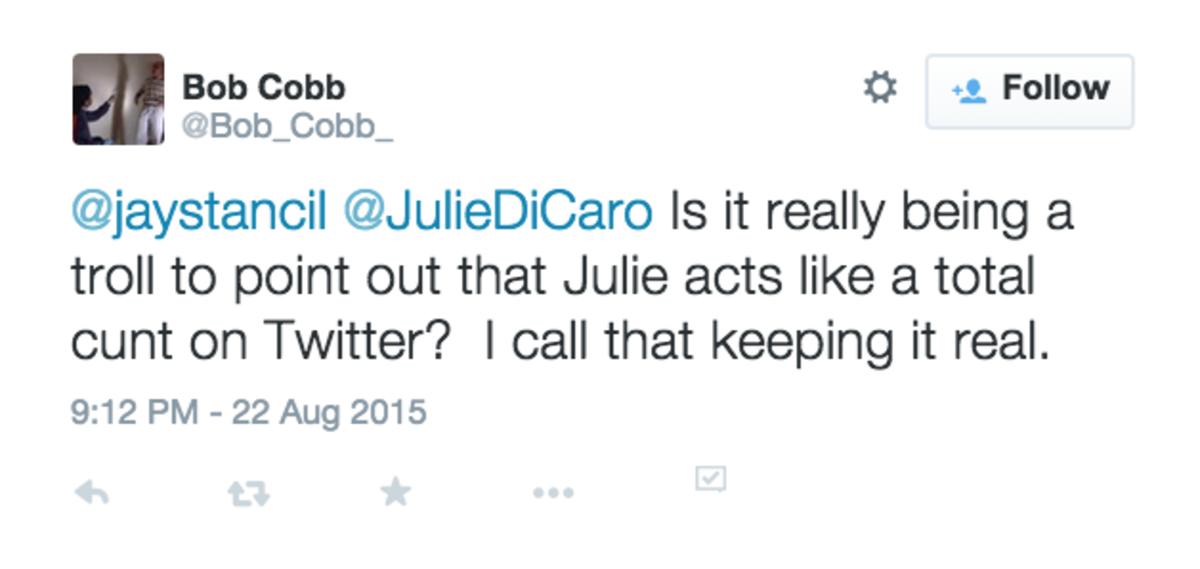
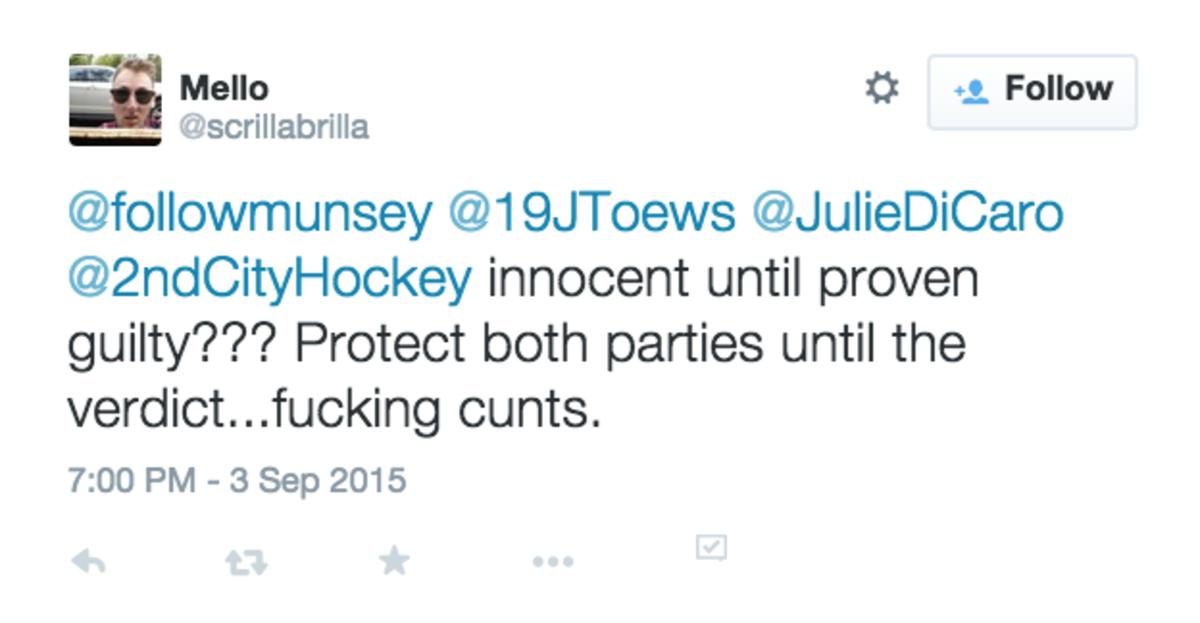
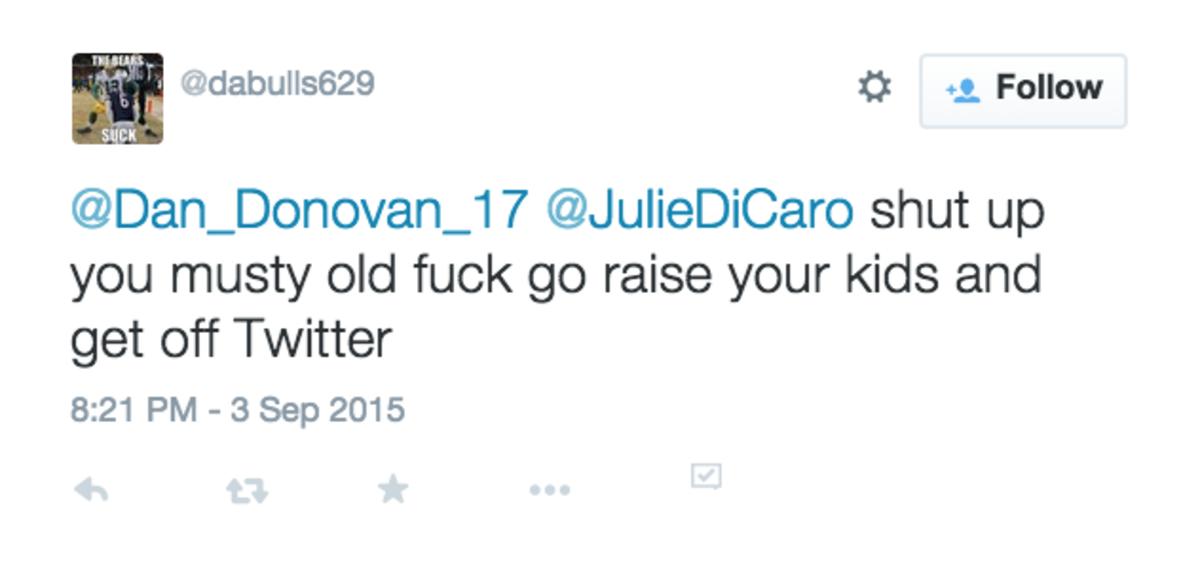
Sadly, the vitriol I've experienced on Twitter hasn't just been in connection with sports. Speaking out about my own rape—as personal and as sensitive a topic as can be imagined—drew a string of tweets just like these:


Be it a conversation on heavy subject matter like violence and sexual assault, or a discussion of things as trivial as the Bears 3–4 defense, tweets like these are simply a part of my reality, nearly every single day. And I’m not alone.
Freelance journalist Jessica Luther writes frequently about violence against women in the sports sphere, and broke stories on sexual assault scandals at Baylor and Vanderbilt. And as a result, she’s had invective hurled her way over the years:
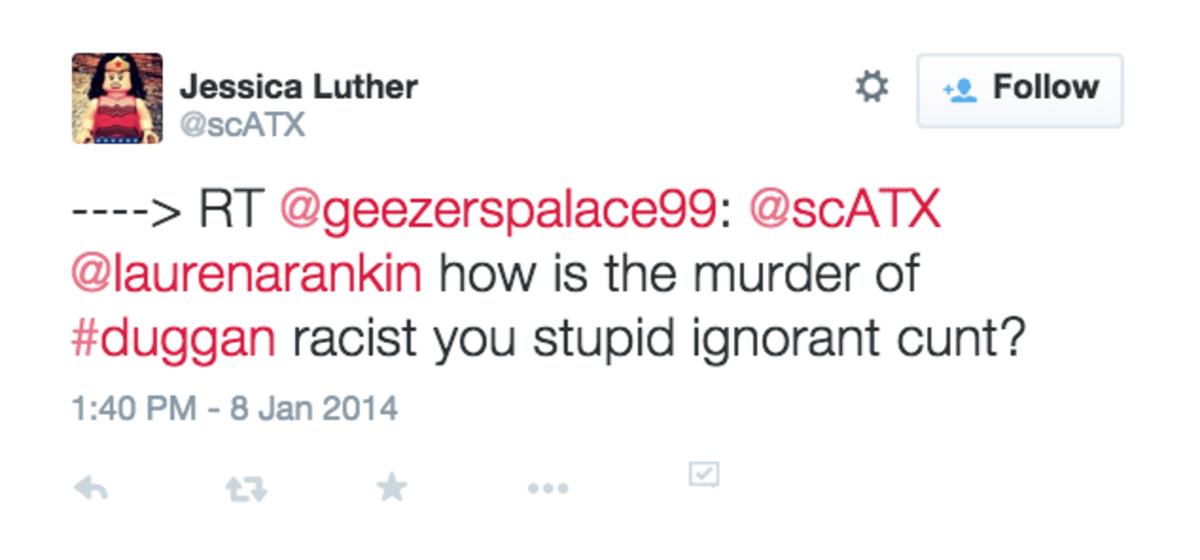
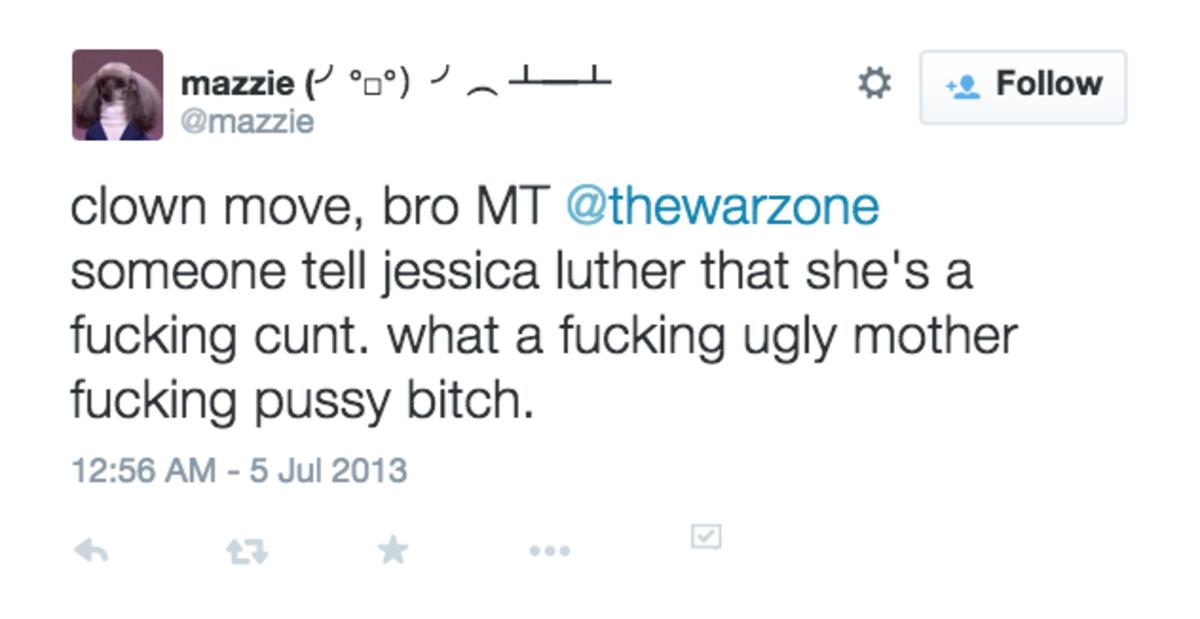
Luther says she’s conditioned herself over the years not to read the comments on pieces she publishes, but is often forced to block and mute Twitter trolls intent on insulting and intimidating her.
“I think attacking women who talk about sports often stems from the idea that women simply don’t belong in sports, especially not in men’s sports,” Luther says. “Women shouldn’t have an opinion, and certainly not one that challenges the systemic issues endemic in the sport or team or league someone else is invested in. But also, you just shouldn’t have an opinion about who plays better at the quarterback position, or what team will make the postseason. If you dare to have one, well then, you are just asking for someone (often a man) to correct it.”
ESPN’s Jemele Hill, co-host of His & Hers, also has been a frequent target of online vitriol:
“I’ve been called a whore, a black bitch, a nigger, a monkey, an Uncle Tom, and had my sexuality questioned,” said Hill, unable to decide the worst thing she’s ever been called on Twitter. While she learned to cope with the online venom by being “quick with the block button,” Hill agrees that women are lightning rods for a special breed of nastiness on sports Twitter. “Women who are confident, assertive and opinionated are resented in every sector of society. The difference is that the relative anonymity of social media empowers the trolls to say things to women that they wouldn’t dare say if they were before us in person.
“When it comes to sports, women are big targets for abuse because the resentment is two-fold. Some resent us for our confidence and beliefs. But there also is an added resentment because we are supposedly infiltrating a space that has been decidedly male. There are some men who don’t want to share that space, because our presence changes that dynamic. Suddenly they have to be 'civilized.' It’s no longer a no-holds barred environment. Because women are not only present in sports, we’re demanding something from them. We’re demanding respect, and some just don’t like it.”
While the idea that a certain faction of men resent women’s infiltration into their last bastion of guy-dom seems like something society should have resolved decades ago (along with racism, homophobia, and, perhaps, basic table manners), Andrew Dzurisin, assistant professor of sociology at Middlesex County College, believes Hill and Luther are thinking along the right lines.
“Of all areas of society, I believe men still think of sports as their domain,” Dzurisin said. “If you look at American males (especially those with a [high school] education or less), they are falling behind women in many areas. To me, it is 'This is my turf, not yours.' If you look at their tweets, most generally articulate they believe in very traditional gender roles. Women working in sports or interested in sports are their worst nightmare. It’s bad enough she is probably outpacing me career-wise, but how dare she try to infiltrate the one area that I believe is exclusively male.”
While it’s tempting to write off the men who send violent and demeaning tweets with a “don’t feed the trolls” mantra, there is something larger at work here. Simply observe hashtags such as #isupport88 and communities like Florida State Twitter any time Jameis Winston’s name comes up, and you’ll see a steady drumbeat of threats, obscene names, and in some cases, a plainly stated desire for rape and retribution. Add in that many accounts used to harass women are either newly created for that express purpose or run by people who systematically delete the tweets after they hit their mark (thus the need to take screenshots to preserve them), and you get a better understanding of the mentalities involved.

Make no mistake, these tweets are not meant to express disagreement. They are calculated to destroy, demean, and denigrate the women they target in a public forum. And even in their choice of hateful language, these men provide hints of their own warped value system. Because it’s not enough for such fragile men, threatened by the changing world around them, to simply tell a woman she’s wrong, or even that she’s stupid. These comments attempt to cut much deeper, striking women at what misogynists see as their most valuable characteristics: appearance, sexual purity, sweetness and submissiveness. In the world these men inhabit, a world that increasingly exists only in their own troubled minds, the worst possible thing a woman can be is a fat, slutty cunt.
As a talented psychologist recently told me, “You’re the landlord of your head. You get to decide who rents space there.” That's great advice for anyone dealing with an onslaught of bullies, but not necessarily an answer to a societal problem that continues to spiral out of control. It’s time that women—and the vast majority of men on Twitter who value women’s place in the discussion—take back the space from those who use it to exclude and demean.
The responsibility is shared, by the owners and operators of the social networks who must live up to their promise to crack down on abuse, and by those who implicitly condone the behavior every time they observe it without speaking up. Progress may be challenging, and slower than anyone would like, but no good ever came from resignation. It’s time for the forces that carved out a space for women in locker rooms to do the same in our online communities.
There’s no reason that I—and the thousands of other women in the field—should have to tolerate things online that no one would ever accept off it.
Julie DiCaro is a former attorney who is currently a writer for The Cauldron and an anchor for Chicago sports radio station 670 The Score.

